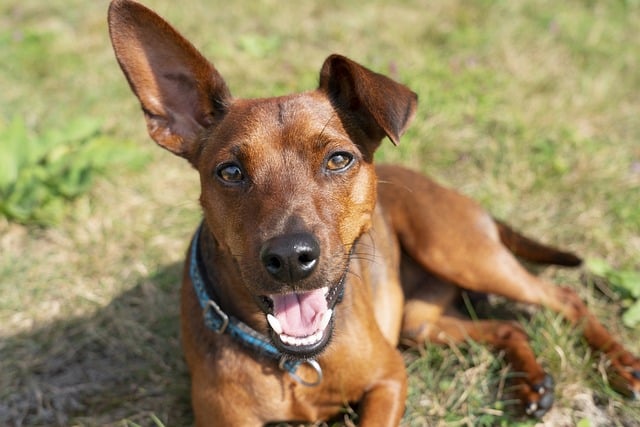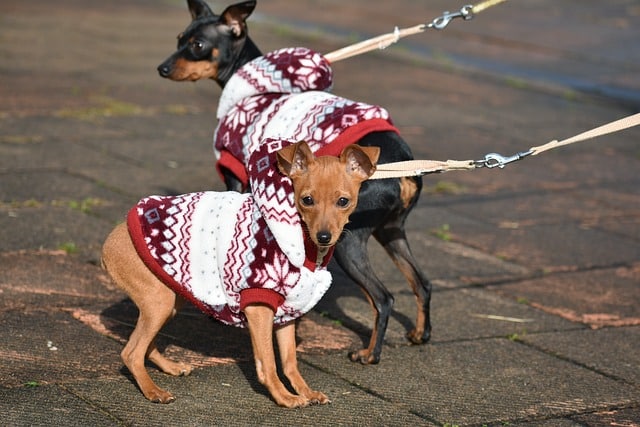Miniature Pinschers, often referred to as “Min Pins,” are charming, fearless little dogs packed with personality. However, as with many dog breeds, misinformation and myths about them persist. These myths can prevent potential owners from considering this delightful breed or lead to misunderstandings about their care. To set the record straight, here are five common myths about Miniature Pinschers that you should stop believing.
Myth 1: Miniature Pinschers Are “Mini Dobermans”
One of the most widespread myths about Miniature Pinschers is that they are simply a smaller version of the Doberman Pinscher. While it’s easy to see how people might draw this conclusion—since both breeds share similar physical features like their sleek, muscular build and pointed ears—the truth is that Miniature Pinschers and Doberman Pinschers are not closely related at all.
The Miniature Pinscher is an older breed than the Doberman and hails from Germany, where it was bred to hunt rats in homes and stables. The breed’s origins trace back to the German Pinscher, Italian Greyhound, and Dachshund. Doberman Pinschers, on the other hand, were developed much later, in the late 19th century by a tax collector named Karl Friedrich Louis Dobermann, for protective purposes.
Myth 2: Miniature Pinschers Are Aggressive and Hyperactive
Another common myth is that Miniature Pinschers are aggressive, overly hyperactive dogs. While it’s true that Min Pins are high-energy and can be assertive, labeling them as aggressive is far from accurate. In fact, Miniature Pinschers are known for their boldness and courage, which can sometimes be mistaken for aggression. However, with proper training and socialization, these dogs can become well-behaved, loyal companions.
Like any breed, a Miniature Pinscher’s behavior is shaped by its environment and upbringing. When given the right structure and positive reinforcement, Min Pins can be friendly, playful, and affectionate. The key to managing their energetic personality is regular physical and mental stimulation. Without enough exercise and engagement, their energy may be redirected into undesirable behaviors, which can give the false impression that they’re hyperactive or misbehaved.
Myth 3: Miniature Pinschers Are Not Good With Children
Some people believe that Miniature Pinschers do not get along well with children. This myth likely stems from the breed’s assertive nature and their dislike of rough handling. However, Min Pins can thrive in families with children, as long as proper boundaries are established. These dogs may be small, but they have a big sense of self, and they expect to be treated with respect.
The secret to a harmonious relationship between Miniature Pinschers and children is early socialization. When Min Pins are introduced to children at a young age and taught how to interact with them properly, they can become loyal and loving companions for kids. Supervision is key when younger children are around, as Min Pins don’t appreciate rough play, but they’re generally quite happy to be around older, respectful kids who know how to interact with dogs.
It’s also essential to educate children on how to approach and play with small dogs to avoid unintentional injury or fear-based reactions from the Miniature Pinscher.
Myth 4: Miniature Pinschers Are Difficult to Train
Due to their independent and sometimes stubborn personalities, Miniature Pinschers have gained a reputation for being difficult to train. However, this myth isn’t entirely accurate. While Min Pins are known for their strong-willed nature, they are also highly intelligent and capable of learning commands and tricks with the right approach.
The key to successfully training a Miniature Pinscher is consistency, patience, and positive reinforcement. Min Pins respond poorly to harsh or punitive training methods, which can exacerbate their stubbornness. Instead, they thrive with reward-based training, where good behavior is reinforced with treats, praise, and play.
Given their intelligence and desire to please, Miniature Pinschers are more than capable of mastering obedience training, agility courses, and even advanced tricks. The challenge lies in keeping their attention and making training sessions fun and engaging. Short, frequent sessions that incorporate play and rewards work best for this breed.
Myth 5: Miniature Pinschers Are Fragile and Delicate
Many people believe that because Miniature Pinschers are small, they must be fragile and delicate dogs that require constant pampering. In reality, Miniature Pinschers are surprisingly sturdy and resilient. Despite their petite size, these dogs are incredibly athletic and thrive on physical activity.
Originally bred to chase rats and other small vermin, Miniature Pinschers have a strong prey drive and a natural agility that belies their small stature. They enjoy long walks, interactive play, and even participating in dog sports like agility or flyball. While their small size means you need to be mindful of rough play, they are far from fragile.
One area where Miniature Pinschers do require special care is in cold weather. Due to their short coats and lack of body fat, Min Pins can get cold easily, so they may need a doggy sweater or coat when venturing outdoors in chilly temperatures. However, this does not mean they are overly delicate—it simply means that like many small, short-haired breeds, they need a little extra warmth during winter months.
Understanding the Real Miniature Pinscher
Miniature Pinschers are a breed full of surprises. They may be small, but they are incredibly bold, intelligent, and active. By dispelling the common myths that surround them, potential owners can better appreciate the true nature of these delightful dogs.
Whether you’re drawn to their high energy, curious personality, or their loyal and protective nature, Miniature Pinschers make wonderful companions for those willing to invest in their training and exercise needs. They’re not tiny Dobermans, they’re not overly aggressive, and they’re far from fragile. Miniature Pinschers are unique in their own right—a breed that brings big personality in a small package.
If you’re considering adding a Miniature Pinscher to your family, it’s important to approach them with an understanding of their true traits and needs. With the right care and training, these dogs can become devoted and loving members of your household, shattering any lingering myths in the process.


 Toledo, United States.
Toledo, United States.